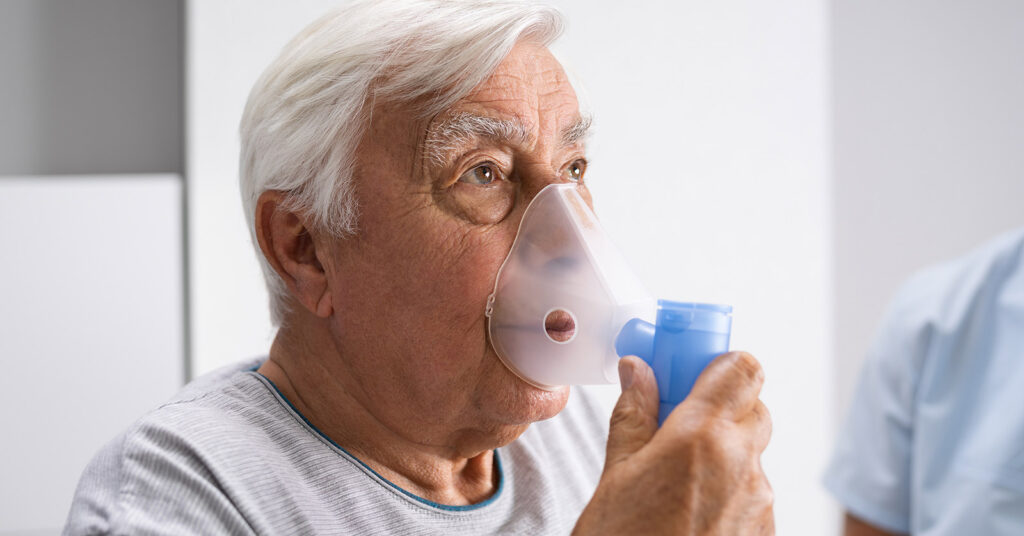
WHAT IS COPD?
Chronic obstructive pulmonary disease, or COPD, refers to a group of diseases, including emphysema and chronic bronchitis, that cause airway obstruction and other breathing-related problems. Chronic respiratory diseases comprise the third leading cause of death in the U.S. While more than 16 million Americans have COPD, millions more are not being treated and may not even know they have the condition.
CAUSES AND RISK FACTORS
Chronic lung disease is a serious condition that has no cure. It must be managed with medication and lifestyle changes that delay the progression of the disease and reduce exposure to triggers.
Smoking is the primary cause of COPD in the United States. Other triggers include secondhand smoke and environmental pollutants, such as certain heating fuels, dusts, gases and fumes. These pollutants can both cause and exacerbate the condition.
Current or former smokers, women, people over 65, people unable to work and those with a history of asthma are more likely to receive a diagnosis of COPD. But people as young as 40 can find themselves at risk if they smoke or have a family history of chronic respiratory disease. Poor health habits and lack of exercise also exacerbate the symptoms of COPD.
TREATMENT OPTIONS AND SYMPTOM MANAGEMENT
See your doctor if you regularly experience one or more of the following symptoms:
- Shortness of breath during mild to moderate activity, such as walking or climbing stairs
- Frequent coughing (smoker’s cough)
- Difficulty drawing a deep breath
- Wheezing
- Excess production of phlegm, mucus or sputum
COPD treatment requires a thorough evaluation by a physician. He or she can prescribe medication and other approaches that can alleviate symptoms, decrease the frequency and severity of complications, and increase your tolerance to physical activity, which will affect your quality of life. You doctor may recommend some or all of the following treatment approaches:
- Avoiding tobacco smoke is the single most important factor in managing COPD. If you are a smoker and have COPD, stop. If others in your environment smoke, ask your doctor to recommend a smoking cessation program.
- Using bronchodilator medications (inhalers) can quickly relieve symptoms such as coughing or shortness of breath. Your doctor may prescribe an inhaler on a regimen or as-needed basis.
- Supplemental oxygen may be recommended if your doctor detects low blood oxygen levels that indicate declining lung function.
- Guard against lung infections. Your doctor may recommend annual flu and pneumococcal vaccinations, which are especially important for people with COPD. Be sure to alert your doctor if you have a fever or notice a change in the amount or color of your sputum, which may indicate an infection requiring a course of antibiotics.
- Pulmonary rehabilitation is a COPD management program that teaches strategies such as learning how to breathe more efficiently, ways to conserve your physical energy, and advice on diet and exercise.
- Get some exercise every day you can. It will improve your stamina and your outlook on life. Be sure to check with your doctor before starting any new exercise regimen.
- Lose weight. People with COPD who are overweight find it harder to breathe and exhausting to move around. Your doctor can help you to determine a healthy weight for you and can refer you to a dietician or nutritionist for support.
- Conserve your energy. Get sufficient rest and quality sleep. Find other ways to conserve your energy, such as wearing loose, comfortable clothing, minimizing stair-climbing, and adapting your home to help you move around more easily. An occupational therapist can help, so ask your physician for a referral.
While there is no cure for this chronic, progressive disease, COPD symptoms can be managed with medication and lifestyle changes that can help you feel better and live longer. It’s a lifetime job—in every sense of the word.
WORK CITED
“Chronic Obstructive Pulmonary Disease (COPD).” Centers for Disease Control and Prevention. Page last reviewed: July 19, 2019. https://www.cdc.gov/copd/index.htm
“Chronic Obstructive Pulmonary Disease (COPD) Among Adults in Texas.” Centers for Disease Control and Prevention. https://www.cdc.gov/copd/maps/docs/pdf/TX_COPDFactSheet.pdf
“What can you do to manage your COPD?” British Lung Foundation. Page last reviewed: September 2019. https://www.blf.org.uk/support-for-you/copd/managing-my-copd





